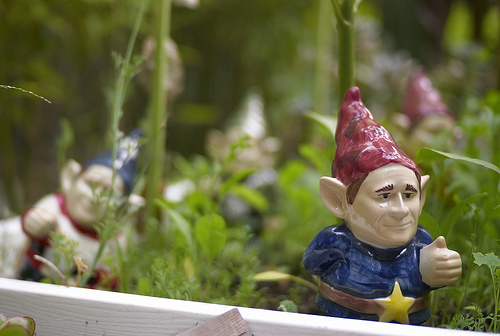Sometimes, I give pep talks. Not the standard “He was a total bastard. You can do so much better!” ones. I’m terrible at those. No, I mean the “You are smart and capable and this situation can be successfully handled in the following eight ways” kind of pep talks. I gave one of those the other night. Via Skype. With a drink in my hand. Yeah, occasionally things get a little AbFab around here.

This is the gist of it:
Pessimism is a self-fulfilling prophecy. No one ever looks at a situation, decides it’s going to hell in a hand basket and then makes up their mind to move mountains to make sure that doesn’t happen. No, people decide things won’t work out and then they check out. Why throw good money after bad? Why bet on a losing horse? Why look like even more of a sucker? Why risk getting hurt or humiliated, no matter how remote that possibility?
But if some part of you doesn’t hope and believe that things will work out, you have no impetus to do your damnedest to make sure that they do. Optimism is that motivator. You see an opportunity, you imagine what could come from it and that gives you a kick in the pants to make an effort to achieve what you’re envisioning. Optimism isn’t about naively waiting and hoping for the universe to make good on what you feel it owes you or believing that luck will save the day. It’s about choosing to see the good side and all its potential, it’s about dreaming up a scenario in which you get exactly what you want and letting this vision motivate you to go after that very thing with gusto. Optimism begets action. And action gets you closer to what you want. Every. Single. Time.
There is always the chance of disappointment. I’m the first to admit that disappointment hits me harder than most. I take promises to heart. I take declarations at face value. And I get very hurt when other people don’t live up to their end of the bargain or when I trust in the fairness of life and get burned for my belief. But I’m also stubborn enough not to let disappointment (or the mere possibility of it) rob me of my hope in the best case scenario, the hope that drives me to do everything with my power to bring that scenario to fruition – last time, this time, next time, every time. As Eisenhower is often quoted as saying, “Pessimism never won any battle.” And we all do a lot of fighting in this life.
Recently, I was talking shop with a fellow writer. She was filling me in on the status of a pitch she had submitted the month before. It ended up that the outlets she targeted had already filled their editorial calenders for the month, but at least one of those publications was so impressed with her idea that they invited her to pitch them something else. Instead of writing that off as simply a polite form response, she sees it for what it is – a golden opportunity to get published by a site she’s had her eye on. She’s already at work on her new pitch. If they’re going to open the door, there’s no way she isn’t going to walk right through.

My boss at Forbes will sometimes send out story ideas to a handful of us who tend to cover issues related to the twentysomething work experience. Even if I’ve just filed a piece the day before or plan to file one tomorrow or have other things on my plate, I will always volunteer for one of the assignments. I want to stand out and I want to distinguish myself as dependable and adaptable, because when a big tip or a new opportunity crosses her desk, I want mine to be the name that comes to mind.
Eagerness and ambition are not undignified. Not in your professional or personal life. We’re all big kids, we can tell the difference between stalking and wearing our hearts on our sleeves because damn it, these are our feelings and we own them. Being enthusiastic and going all in isn’t a sign of desperation, it’s a sign of someone who knows what they want, knows what they can bring to the table and isn’t too self-conscious to let everyone else know it, too. That takes guts. A LOT of guts. There’s so much playing it cool, so much blase bet-hedging, that someone who shows up hungry and says, “Hell yes, I want this!” stands out. In the best way.
Be that person.
And if you won’t take my word for it, you should at least listen to Cat Stevens.
I received an avalanche of questions in response to
this post, so we’ll pick away at the queries over time.
First up:
“When working on a project, how do you know when to stop?! I could go on editing forever. I’m never completely satisfied, I think I’m done, but then I wake up the next day and want to change something, then find myself changing nearly everything. This is a chronic problem and keeps me from finishing any project I start.”
Recently, we had a workshop for all the employees at my job. During this workshop, we had to break into groups for a rousing afternoon of brainstorming. After all the flipcharts and markers, each group leader had to present their team’s findings to the rest of staff. One of my colleagues said something that perfectly (albeit inadvertently) answers your question:
“We need to start working to tolerance, not perfection. Our clients aren’t paying us for perfection, so why are we giving it to them for free?”
While his words do apply to our industry, they should also become your new mantra. From now on, instead of waiting to fall in love with your manuscript (newsflash: it probably ain’t gonna happen), as soon as you get your draft to a point where the thought of it doesn’t make you dry heave, you’re done. Hit it and quit it. No incessant tinkering or fiddling or angsty red inking. Drop your pen, step away from the laptop. Hit send, hit print, shove that stack of papers in a drawer and don’t so much as look at it for a month. You are no longer working to perfection. Tolerance is your new benchmark. Embrace it.
I opine about the nuts and bolts of writing over at Forbes pretty regularly (Andrew Sullivan is a fan!), as well as field writing-related questions via social media and email. I answer these questions individually and I sometimes regret that I don’t have the opportunity to share the responses with the whole GenMeh class. There’s an easy way around that, obviously. I’ve decided to do a writing Q & A on the blog. You send me your questions and I’ll answer them in an upcoming post. It’s the kind of brain picking that I normally caution against, but in this case it’s a win-win situation – you get free advice and I can simply point the next answer seeker to the resultant post, which will mostly likely contain the details he or she is looking for.

So, ask me anything about my writing, the craft of writing itself, pitching and marketing your work, the freelance life, etc. I’ll pick a cross-section of questions and give you my no-holds-barred answers.
Send your questions to jmh(at)generationmeh(dot)com, post them on GenMeh’s Facebook wall or if you’re feeling particularly succinct, tweet them @GenerationMeh
I’m not going to name names. I was reading someone’s something the other day and I realized how very much this something sounded like all of their other somethings. Call it a beat, a niche, an area of expertise, I just called it tired. It’s the same old saws, the topic spun and respun in a new way, the perspective that might have raised an eyebrow the first time you read it, but after the 53rd? Not so much. It reminded me of my flirtation with getting a PhD. I remember one of my classmates turning to me with genuine panic in his eyes and in his voice. “I don’t want to be the energy guy. I’m going to do this thesis and then I’ll be the energy guy forever. That will be my thing.” I left the program shortly after that, but I’ve always wondered if he did indeed go on to become the energy guy.

I don’t want to be the energy guy, either. Just like I didn’t want to be the Gen Y girl, just like I don’t introduce myself first and foremost as a vegan or a feminist or someone who can’t eat gluten. These are facts, not representative of my identity as a whole. I thought about this again last night when I got into the latest of half a dozen discussions-slash-arguments with a certain someone about how I hated being penned in or reduced or summed up by a handful of one-dimensional descriptors.
I don’t do personality shorthand.
Who says that there has to be one thing at which you specialize or that you have to filter the world through only one lens? That you always have to be wearing your Virgo/youngest child/introvert/diabetic label or clinging to it like an security blanket? Who says that you’re doomed to only ever write about your own lived experiences or to pursue only jobs that align with your college major or that you can never admit to enjoying the smell of steak on the grill because you swore off animal products?
Labels are for medicine bottles and lenses are for eyeglasses. By contrast, people are messy and contradictory and infuriating and complicated. You’re more than the sum of your parts, more than whatever box you’ve been dropped into or voluntarily crawled inside. And to keep going back to the same well, telling the same stories to and about yourself and believing that a bullet list of nouns passes for your essence sells yourself much too short.
You are not the energy guy and you shouldn’t aspire to be.




